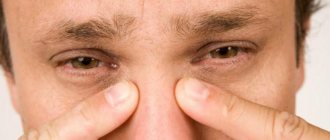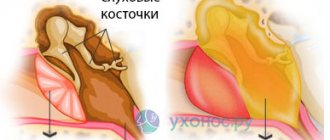Many parents are constantly worried about the health of their long-awaited baby, especially if the child is the first-born in the family. They are often tormented by questions: does the baby cry too much, does he spit up often, is he gaining weight well, is he growing quickly, is he sleeping enough.
Healthy sleep, along with good nutrition, is vital for a person. This statement is doubly true when it comes to a little man. To ensure the harmonious development of the baby, it is necessary to establish a sleep schedule. A caring mother rocks her newborn for hours, listens to the breathing of the sleeping baby, and approaches the crib many times. It happens that a mother suddenly notices that the child is sleeping with his mouth open. The question inevitably arises in her mind: is this normal?
Sometimes newborns sleep with their head open, which greatly frightens young parents.
Some parents may immediately consult a doctor, while others will try to figure out why this is happening on their own. Advice from relatives and friends, online forums, and articles by the famous pediatrician Komarovsky come to the rescue. Often, loved ones try to allay the fears of new parents. Having heard that a friend’s child is also snoring funny with his mouth slightly open, the mother may lose her vigilance.
How should a healthy baby sleep?
Compared to adults and older children, a baby's muscles are in increased tone. During sleep, the newborn assumes the position it occupied before birth. Up to three months, a healthy baby sleeps lying on his back, with his limbs bent and breathing through his nose.
If a baby's mouth is slightly open in a dream, this does not always mean that its nose is not breathing. Perhaps the baby simply tilted his head back very strongly and the orbicularis oris muscles relaxed. To understand whether this is so, just listen. If we don’t hear sniffling, the baby’s nose really isn’t breathing.
How can improper breathing be dangerous?
In infants, the capillary network is located on the surface of the oral mucosa and can easily be damaged by small dust particles. The baby’s immune system is still immature, so a bacterial infection can easily penetrate the tiny body.
Dust, which inevitably accumulates in any apartment, can cause infection by entering the baby’s lungs through the mouth.
Thanks to the structure of the nasal passages, cold air is warmed before entering the bronchi. In addition, the ciliated epithelium of the nasal mucosa retains dust and pollen, protecting the baby from developing asthma. The mucus produced in the nasal passages traps and partially destroys bacteria.
When a person breathes through the mouth, cold, polluted air enters the bronchi. To prevent the development of respiratory diseases, parents should make sure that the baby is breathing properly.
If a child always breathes only through his mouth, he experiences oxygen starvation, which leads to suppression of brain activity and the development of anemia. The baby becomes weak, lethargic and apathetic, and may subsequently lag behind in intellectual and physical development. Such children get sick much more often than their peers due to weakened immunity. If a newborn breathes through his mouth, his voice becomes nasal and monotonous (we recommend reading:). The child loses the ability to perceive smells and suffers from lack of appetite.
Why does the baby breathe through his mouth?
The reasons need to be identified as quickly as possible. They can be harmless and easily eliminated, or serious. The most common:
- Physiological rhinitis in a newborn
. After birth, a person moves from an aquatic habitat to an air one. For some time, the mucous membrane adapts to new conditions and secretes more mucus than necessary. In addition, the nasal passages of infants are much narrower than those of adults. As a result, the baby does not breathe through his nose for some time - he has to breathe with his mouth open.
One of the reasons for nasal congestion may be physiological rhinitis, which is associated with the structural features of the nasal passages of newborns.
- Unfavorable climatic conditions in the nursery
. Low or high air humidity, gas pollution, dust in the room, and infrequent ventilation can lead to swelling of the baby’s delicate mucous membrane and the formation of crusts, which interfere with breathing through the nose. - Respiratory tract infections and allergic rhinitis
. Infectious diseases increase the viscosity of mucus. An infant does not know how to blow his nose and therefore does not breathe well through his nose, not only during sleep, but also during wakefulness. - Adenoiditis
. Excessive enlargement of the nasopharyngeal tonsil occurs even in infants. This is usually preceded by infectious diseases - diphtheria, measles, whooping cough, scarlet fever. Impaired nasal breathing and persistent runny nose are one of the main symptoms of enlarged adenoids. If the baby constantly breathes incorrectly, his appearance changes: the bite is disturbed, the upper jaw protrudes forward. The facial expression becomes meaningless - the lower jaw droops, the nasolabial folds are smoothed out. Over time, the chest becomes deformed and becomes keeled or “chicken-shaped”. Due to the enlargement of the tonsil, blood circulation in the nasal mucosa is disrupted, which contributes to the development of chronic rhinitis and sinusitis. Complex respiratory diseases may develop - sore throat, tracheitis, laryngitis. Often the child develops anemia. The sleep of such children is restless, the child snores, and headaches often occur. Parents notice that the child’s memory has deteriorated and the baby has become absent-minded. - Dental problems
.
Troubleshooting
It is important to know not only why people sleep with their mouths open, but also how to fix it. Healthy people breathe through their nose. But if there is congestion, allergies or ARVI, breathing becomes difficult. There are medical tips to eliminate the problem:
- For a runny nose and nasal congestion, drops with a vasoconstrictor effect are used. But you cannot use such medications continuously. The course of treatment should be a maximum of 7 days. Otherwise, addiction appears.
- Allergy medications are used. Doctors may prescribe medications with hormones. But this is done only as an auxiliary therapy to eliminate allergies.
- If there are adenoids and apnea, surgical intervention is prescribed. These treatments are rarely used because proven therapeutic options exist.
- Concentration of attention while breathing is effective. You can go to yoga, where trainers teach you how to breathe correctly. These exercises can eliminate the problem, reduce anxiety and stress. Thanks to daily practices during the day, you will be able to fall asleep calmly and with your mouth closed.
- Sleep should be in a comfortable environment. Although this seems obvious, there are still many triggers. For example, dirt and dust, an unclean bed are pathogenic factors. You need to purchase an air purifier and humidifier.
- There is a mouthguard or pacifier for adults. Using the device, the position of the tongue is changed and the jaw is fixed in a closed position. Special jaw retainers are also sold.
With the mouth open, there is a decrease in salivation. As a result, there is a disturbance in the perception of taste sensations, and difficulties arise in chewing and swallowing food.
When dry mouth manifests itself with pain, cracks in the mucous membranes and corners of the lips, an appointment with a therapist is required. This is due to the fact that the phenomenon may be a symptom of a hidden illness of the internal organs. Fixing the problem is not difficult. It is necessary to devote time and attention to this, and the condition will improve.
What to do?
If you notice that your newborn often or always sleeps with his mouth open, consult your pediatrician as soon as possible. Reading Komarovsky's articles and advice from experienced mothers does not replace the need to visit specialists.
- It may be quite enough to change the baby’s sleeping position by placing a diaper folded several times under the head.
- Physiological rhinitis can be treated by rinsing the nose with saline and removing excess mucus using an aspirator.
- To eliminate the problem, you may need to adjust the microclimate in the nursery: ventilate it more often, carry out wet cleaning, empty the room of soft toys (they accumulate dust), create an optimal temperature - about 20 degrees.
- If the cause of improper breathing is a disease, in addition to rinsing the nose with saline, the doctor may prescribe vasoconstrictors.
- For a bacterial or viral infection, a specialist will prescribe appropriate therapy.
- If nasal swelling is caused by allergies, medications will be used to eliminate the symptoms of this disease, and a diet may be prescribed. Often allergies are caused by pets, in which case you may need to get rid of them.
Under no circumstances should you listen to advice that there is no need to treat adenoids, as if the child will “outgrow it.” The decision on treatment methods for adenoiditis is made solely by the otolaryngologist. The doctor will prescribe surgical or conservative treatment depending on the size of the adenoids and the degree of respiratory impairment of the child.
Fresh air is necessary for a speedy recovery. If there is no temperature and good weather (warm, no precipitation, no strong wind), it is possible and even necessary to walk with your child. Walking helps your baby get rid of swelling and recover faster. But if the cause of nasal congestion is an allergy to pollen or other impurities in the air, you should refrain from walking if possible.
Many parents notice that their child's rum is constantly open. What is the cause of this problem and is it really a problem? A constantly open mouth is not only an aesthetic problem; such a phenomenon can pose a serious threat to the baby’s health.
Causes
What is the reason why a child's mouth is constantly open? This question cannot be answered immediately and unambiguously.
So, let's look at the possible causes of this problem:
- Habit. This point is not entirely the reason, however, it is worth noting that children are copies of us adults. Watch, perhaps someone close to you often walks in front of the baby with his mouth open?
- Does your child often get colds? This factor may play a major role in exposing the cause of our problem.
- If a child's mouth is constantly open, the cause may be a violation of the respiratory system.
- Physiological characteristics of the body.
- Presence of psychological problems or development of a neurological disease:
- hypertonicity,
- ischemic damage to the central nervous system.
- muscle failure.
- ENT diseases:
- sinusitis,
- Dental diseases:
- caries,
- tooth decay,
- tooth loss,
- finger sucking or excessive love for the pacifier (pacifier),
What to do if a child's mouth is constantly open?
We talked about what the reason may be, but it is impossible to accurately determine it on your own. It is very important to undergo a medical examination, which will help identify health reasons or refute their presence.
So, you noticed that the child’s mouth is constantly open, watch the baby - whether he breathes through his nose or whether he always uses only his mouth to breathe. Is an open mouth accompanied by excessive drooling? If yes, there is.
If a child develops such a habit as a constantly open mouth at the age of 6-7 years, most likely he is simply imitating one of the adults.
Pay attention to the condition of your child’s teeth; if you notice anything wrong, take your child to the dentist. Breathing problems require consultation with a doctor. A child’s constantly open mouth due to ENT diseases, of course, requires a visit to an ENT doctor. Adenoids are the most common cause of an open mouth in a child.
You should not scold your child if he constantly opens his mouth, because the problem may be much deeper than you think. An open mouth is a reason to think about the baby’s condition, since this phenomenon can cause new ailments.
Nasal breathing plays an important role in our lives. First of all, nasal breathing provides humidification, purification and warming of the inhaled air. In addition, when breathing through the nose, brain receptors are activated, which is necessary for the normal course of gas exchange in the blood. Therefore, it is very important to monitor the child’s breathing, and if problems arise, take care of his health.
If the baby's mouth is always open, this becomes a real problem that worries parents. In addition to the fact that it is not aesthetically pleasing, this manner is a source of complications in the future, including: abnormal development of the nasopharynx, facial disharmony, and malocclusion. You should not ignore the problem, hoping for it to disappear on its own, but immediately begin to determine its cause.
Incorrect posture
Why do people sleep with their mouths open if they don't have nasal diseases? According to somnologists, this may be due to incorrect resting posture. Incorrect body positions include sleeping on your back. The condition described in the article appears from a low pillow when the head is thrown back and the teeth become separated.
People who move around in bed during sleep often end up face down. This results in a slight deformation of the mouth or the nose pressing into the pillow. This is how a person opens his mouth so as not to suffocate.
Somnologists advise performing a simple procedure at night - inspect the bed for a comfortable location. You need to lie down for a few minutes and evaluate the comfort. You can take soothing herbal tea, close the windows with curtains and ventilate the room. This improves sleep.
Reasons for a constantly open mouth
ENT diseases are the main culprits of a child’s constantly open mouth. Why is this habit formed? Adenoids, sinusitis, sinusitis, otitis make nasal breathing difficult. This problem sometimes remains even after removal of the pathologically enlarged nasopharyngeal tonsil. In this case, additional diagnostics are required to prevent relapse.
Nasal polyps cause the child to open his mouth frequently (see also:). Overgrowth of the mucous membrane is often associated with a congenital abnormality of the nasal septum or allergies. The operation eliminates the formation, but not its cause. It is necessary to promptly treat infectious diseases of the nasopharynx, preventing them from becoming chronic.
If your child's mouth is constantly open, it may be due to dental problems. Caries and deformation of tooth enamel contribute to malocclusion in a child, which leads to incorrect positioning of teeth and tongue. The baby's jaw shape changes, which leads to difficulties with nasal breathing.
The problem of a constantly open mouth is often associated with finger sucking and pacifier abuse in infancy. Holding foreign objects disrupts the normal development of muscles, causing them to form according to this habit. If this condition is ignored, the child cannot close his lips, and his tongue falls out during speech.
The habit of keeping your mouth open can develop from constant pacifier or finger sucking in infancy.
A child's constantly open mouth is sometimes a consequence of insufficient development of the circular muscles - dense fibers that frame the lips. Reduced tone of these tissues at a young age is the norm. This problem should not be a concern, as it disappears after some time without outside intervention.
The baby may have an open mouth due to a short frenulum of the tongue (we recommend reading:). If the processes of breathing and speech are disrupted, the child gradually gets used to keeping his mouth open. The problem is easily fixed with surgery. It is necessary to carry out the surgical procedure as early as possible, before the baby develops a strong habit.
Pathological cases are when an open mouth is accompanied by strong salivation and a protruded tongue. These symptoms indicate neurological disorders: muscle hypertonicity or severe damage to the central nervous system. It is necessary to immediately contact a specialist for diagnosis and treatment.
Parents may have a question: why is the child’s mouth constantly open if no pathologies have been identified? Often this manner is a consequence of an adopted bad habit.
If, for example, before the age of 5, a child did not have a deviation in the form of a constantly open mouth, then this most often indicates that the child is copying someone else’s behavior. Perhaps he is watching a baby or imitating a dog panting.
In this case, you need to monitor the child, paying attention to the time of occurrence of the disorder: whether it lasts from the first months of life or appeared recently. Perhaps it occurs only in certain circumstances, with surprise or concentration. They also take into account how the child breathes - through the mouth or nose.
What is the danger of not breathing through your nose?
Mouth breathing disrupts the functioning of the entire body. A person should always inhale air through the nose, since this mechanism ensures the sanitation and warming of air masses entering the body. In this case, brain receptors are activated, triggering the processes of blood gas exchange and oxygen supply to internal organs.
If a child's mouth is constantly open, he or she gets colds more often; the disease is more difficult to treat. Due to insufficient oxygen supply to the brain, the baby develops anxiety and restlessness. Such a patient experiences intermittent sleep, which makes him distracted and restless. Problems with posture and speech gradually develop, which makes it difficult to communicate with peers.
If the baby does not close his mouth, his bite is disturbed. Normally, the tongue rests on the lower jaw, which ensures its normal development. When breathing through the mouth, it forms more slowly, which over time leads to disharmony of the oval of the face. Such patients are distinguished by a retracted chin and increased grinding of the upper teeth by the lower dentition.
Lack of nasal breathing leads to an incorrect open bite
Constant nasal breathing leads to deformation of the entire face, which is expressed in the following disorders:
- drooping head and the appearance of a double chin;
- narrowing of the nasal passages with simultaneous expansion of the bridge of the nose;
- inability to close lips;
- flat facial features.
Why is it important to sleep with your mouth closed?
Usually such people snore. Often children have a slightly open mouth when they have a dream. Doctors note that the main reason is associated with the canals located in the nose, sinuses and pharynx. Swelling may appear in the oropharynx or the adenoids may enlarge.

Nature dictates that a person should have his mouth closed when breathing. Because air enters through the nose, which is purified and warmed there. If breathing is carried out through the mouth, then a lack of oxygen saturation in the blood develops. In other words, only through nasal breathing do the lungs expand 100%. With the mouth open, only the upper roots of this organ work.
You need to breathe with your mouth closed to reduce the risk of hypoxia, when brain tissue cannot be completely saturated with oxygen. In children, this threatens mental retardation.
Sleeping with your mouth open is dangerous due to the lack of antibacterial substances in the cavity. This leads to the appearance of pathogenic microorganisms. Therefore, an unpleasant odor appears, since with such breathing the mucous membrane dries out, and the secretion of saliva, which kills microbes, is reduced.
What should parents do if their baby's mouth is always open?
Before you see a doctor, you need to check how your baby is breathing. Perhaps he opens his mouth only during an interesting conversation or when watching cartoons. You should close each nostril in turn and ask him to breathe through his nose on the mirror. A large foggy spot indicates a deep inhalation of air, and the mouth opens only due to inattention.
If the cause of constant mouth breathing is a bad habit, you need to talk to the child and convince him to control his facial expressions. At the same time, you should not scold the baby. It is important to clearly explain to him the incivility of this manner and the risk of developing serious disorders. To help him start breathing through his nose faster, they do a special exercise: alternately inhale air through each nostril and exhale through the mouth.
30-03-2008, 03:00
Neurologist, pediatrician, ophthalmologist...:112: We were examined by an ENT specialist - everything is fine, the nasal passages are not narrowed, there are no adenoids, the nose is clean, the mucous membrane is not swollen - everything is perfect...:005: The dentist examined us - the bite is normal, but when closing mouth, teeth closed, lips not closed...:016:
What the problem is, it’s not clear...:008: This backfires on us - on the street we always have an open mouth - frequent colds, therefore, while eating - it’s inconvenient for a child to close his mouth, he chews like a hamster, and his lips are like a tube, if he doesn’t close his lips - part the food jumps back out... I used to think it was just him eating so sloppily. I recently started paying attention to this, before that my son had a lot of health problems - he didn’t have any lips...:)) When I make a remark to him 100 times (especially outside in the cold) - “shut your mouth”, he he closes his mouth, but it’s clear that he’s in an unnatural state, his facial expression is tense and stupid, and he can’t stand it for long. He is already tired of my comments, he simply covers his mouth with a scarf or helmet from below.
Maybe see a speech therapist?:008:
Alena Zhukova
30-03-2008, 03:06
Go to the orthodontist, perhaps trimming the frenulum under the upper and lower lips will improve the situation. We go to Dentideal from MAPO, www.dentideal.ru
30-03-2008, 03:47
I had an incident on this topic - I was going out with my boys (they were about two years old at the time, it was a terribly cold winter). There are two neighbors standing at the entrance (one of them is an ENT doctor). And suddenly I hear behind my back, “She has adenoid children, modern mothers don’t look after their children at all: wife:.” I pretended that I didn’t hear anything. But the second person (the one who is not an ENT specialist) meets us a few days later and reports - an ENT doctor saw you on the street and said that you have terrible adenoids, and then like where is your mother looking, etc. This really hurt me, because my boys are seasoned, their noses are always clean. Well, I complained about the open mouths to the doctors. So, weakness of the facial muscle is very often observed in twins (a neurologist told me this, and a normal ENT specialist naturally confirmed this). And our mouth was open just like that. Now we are 3, in my opinion it has become better. We have now been assigned a light matrix on the face (this is for speech), with the help of which the muscles are either relaxed or toned. So my advice is to see a speech therapist and neurologist. And there’s nothing wrong with that, you can still do a facial massage.
30-03-2008, 10:59
The dentist looked at us - the bite is normal, but when we close our mouth, our teeth are closed, our lips do not close...:016: Our lips are not thin, our mouth is not small.
In theory, the dentist should have seen if it was the frenulum. But I would still start with an orthodontist. In general, maybe this is the structure of the face? Did I understand correctly that the lips do not physically close when the teeth are closed without additional tension? In any case, a competent orthodontist can recommend who to contact next.
30-03-2008, 11:28
The dentist examined us more than a year ago, then we were not worried about this problem (we did not notice it), they checked our teeth. A neurologist saw us the other day, so she asked what was going on and advised us to visit an ENT specialist. ENT did not find any problems. Well, let's go to the orthodontist...:008:
30-03-2008, 11:53
I don’t understand, if a child wants, then he can consciously close his lips? My son’s mouth is also open all the time - and this is precisely the weakness of the facial muscles. We do gymnastics, and I also found out by chance - my eldest and I went to the orthodontist, and the nurse there looked at us and said - her mouth is also open all the time (although with my daughter it’s not so pronounced), she told us to buy wooden spatulas or a ruler and train our lips . The teeth are closed, and with your lips (not your teeth) you need to hold the skewer first across, and then along (that is, it is full length forward - it’s heavier that way). And she also said to periodically place glasses of water in front of the child - take water into the mouth and hold it for as long as possible, then spit it out.
31-03-2008, 16:35
My Plato always has his mouth open, this can be seen in all the photos. :) Previously, I somehow didn’t pay attention, but lately all the doctors have been drawing my attention to this...:ded: In general, please advise who to go to with this problem ?:091: Maybe see a speech therapist?:008:
This is the problem we have...:(
How are you doing with your facial muscles and the tone of your facial muscles in general? If this is the problem, then craniosacral techniques and speech therapy massages could help.
31-03-2008, 23:03
How are you doing with your facial muscles and the tone of your facial muscles in general? If this is the problem, then craniosacral techniques and speech therapy massages could help.
I don’t even know how we’re doing with this...:005: How to evaluate this?:016: In the last couple of months, I began to notice that when my son is nervous, he makes strange movements with his lips, like he has some kind of spasm -the corners of the lips diverge and go down, the jaw tenses, and the face unnaturally warps...:((like a smiley face, only with an open mouth...) What could this be... He does this when something makes him angry, surprises him, or if I’ll reprimand him in a loud voice...:005: I’m already afraid to raise my voice...:001:
31-03-2008, 23:20
I don’t even know how we are doing with this...:005: How to evaluate this? I told the neurologist about this, but she didn’t see any visible problems with us, she even found noticeable improvements; she prescribed me to take phenibut for 1.5 months. In general, I understood one thing - we need to see an orthodontist first, apparently, and then a speech therapist... Right?:008:
I'm certainly not a doctor. But orthodontist is not exactly the right direction. You have obvious neurological problems. You don’t want to consult, perhaps for a fee, but with some good neurologist. You will find reviews about them on the forum. If you have hyperkinesis, that’s one thing; if you have other disorders, then the recommendations will be different. A speech therapist could help in case of spasms of facial muscles or myotonus. From my own experience, I can say that you cannot trust the opinion of just one doctor. If you have doubts, seek help.
01-04-2008, 12:34
It is very difficult to understand what your child looks like from the description. The fact that it should be looked at by a competent specialist is certain, but in what area? You, as a mother, see for yourself what prevents your lips from closing - facial structure, length of the upper lip, tension/spasm of the facial muscles? Is your child's mouth closed during sleep at night? In a dream, you can connect his lips - are they long enough to close freely? Neurotic grimaces are one thing, physically non-closed lips are another. You should probably start with a competent and attentive pediatrician. Are you not observed at IRAV? It would be possible to see Klochkova (she is a neurologist) and a speech therapist there.
If a child's mouth is constantly open, this indicates a habit or pathology. ENT disease is the most likely cause of this phenomenon in a baby. Adenoids, rhinitis, sinusitis, inflammation of the tonsils - these diseases do not allow the child to breathe normally and force them to breathe through the mouth. When the child recovers from them, mouth breathing may not stop and become a habit. This habit is dangerous because the air passing through the mouth is not warmed or purified. Because of this, the baby gets sick more often, and his treated tonsils become inflamed again, his adenoids grow, his bite and speech may even change - a vicious circle is formed.
Dental problems
Why does a person sleep with his mouth open? Dental diseases, although they do not interfere with breathing, still lead to the opening of the mouth. This increases the risk of infection by pathogenic microbes that worsen health. There is also an unpleasant odor from the oral cavity, and there is a risk of caries.
In this case, it is necessary to undergo preventive maintenance at the dentist every year. This also applies to those who do not have pain. Doctors recommend:
- Go to the hygiene office to clean your teeth from carious stones at least 2 times a year.
- Brushing your teeth correctly.
- Carry out rinses and other procedures prescribed by the dentist.
Weakness of the orbicularis oris muscle
Why is the mouth of newborns open? This is caused by a decrease in the tone of the circular muscle located around the lips, which is a bundle of muscles fused with the skin. Mouth breathing in children of the first year of life is considered normal, but make sure that it does not develop into a bad habit.
A timely visit to a doctor and sessions with a psychologist will help eliminate the causes of mouth breathing. Regular massage, special devices for muscle training, exercises will help eliminate the problem if it is not related to the disease. During the examination, the doctor chooses a way to eliminate the deficiency, prescribing conservative or medicinal treatment.











